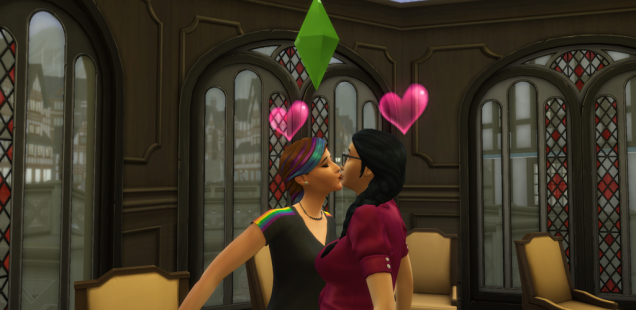
There’s Something About You: Playersexuality And Halfway Representation
James McCoull is a little bi-furious.
In the last couple of decades, as mass acceptance of LGBT+ identities and relationships has crawled forward (and, occasionally, backward) inch by painstaking inch, games have dipped a toe into the exploration of queer relationships within their stories. But, inevitably, games don’t always get it right: romance is a tricky issue in any writerly medium, and queer romance perhaps even moreso. It’s laden with pitfalls and faux pas, subject to personal preference much like anything else, and to top it all off, enduringly controversial in a world divided over the issue of whom it’s okay to love and be loved by.
One issue unique to the games medium is that of playersexuality. Dr. Alayna Cole has previously outlined this phenomenon, but simply put, playersexuality is a form of halfway representation by which romance (especially queer romance) exists in the setting purely for the player’s benefit.
To outline it briefly, playersexuality describes a sort of nebulous sexual identity held by romanceable non-player characters whose preferences never put them out of reach of the player character. In other words, whether you’ve spent fifteen hours in the character creator sculpting a perfect Brendon Urie, or an avatar that looks more like a child’s drawing blasted onto a steak with a shotgun, all these NPCs are emphatically and eagerly dee-tee-eff.
This, on the surface, is not intrinsically a bad thing. We want queer representation in our big-budget Bioware RPGs, and we’ve got it, right? These characters’ experiences of sexuality may be skin deep, but they’re here, they’re queer, and we’re used to it, aren’t we? Who are we to complain if it’s not taking the center spotlight in a game where the story is very much focused on other, more grandiose and apocalyptic themes?
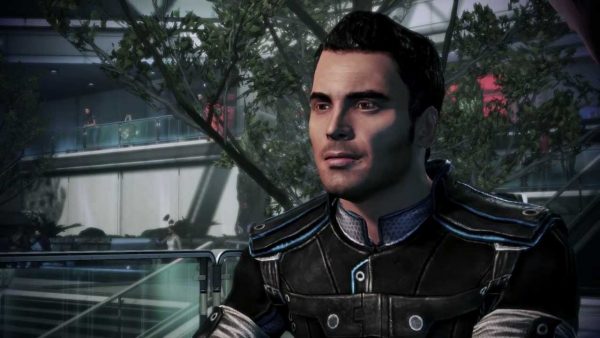
Kaiden has a lot of time to do some soul-searching between the Mass Effect games if he survives Virmire – one effect of which is apparently a bisexual awakening.
It is something, and a queer 14-year-old boy playing through Mass Effect for the first time will undoubtedly be delighted to discover that his particular version of Commander Shepard can bed the moody biotic twunk by the third entry in the trilogy. Back in ‘07, after all, we didn’t even have that!
But it remains to be said that we can do better. We have had better elsewhere already: characters who are queer not for the sake of doubling up on romance cutscenes without having to write and model a new NPC, but because that’s a part of their lives, their history, and their character. Even when it’s a minor facet of a character, a specific sexual identity means a lot more than a playersexual shortcut.
Let’s consider Fallout: New Vegas.
While the Fallout series’ overachieving stepchild doesn’t have anything you’d recognize as a romance feature (sex robots notwithstanding), it does serve to illustrate that you can have solid queer characters in a way that isn’t player-centric and doesn’t necessarily have to serve as the whole plot of the game. Veronica Santangelo is openly gay, but she doesn’t orbit a female Courier with doey-eyed flirtations, and there’s no combination of dialogue choices to get your winkey-eyed fade-to-black and a Well Rested bonus. Veronica’s already got a girlfriend, thank you very much, estranged though she may be.
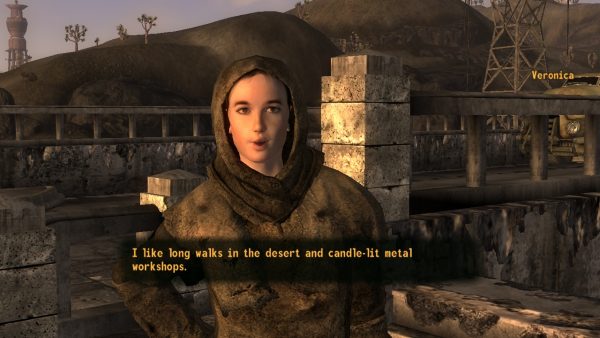
Veronica is openly and unambiguously gay – but she remains off-limits even to a female Courier, as her heart is already spoken for.
Veronica’s sexuality exists on its own terms, and that’s a rare thing for an NPC. It’s troubling to find so many games fraught with the implication that sexuality should exist only in reference to its audience. More than that, it’s deeply jarring too. We talk about immersion a lot in the context of facial animations, weather effects, musical ambience and so on, but it should make us uncomfortable to think that sex and romance in these worlds only exist as game mechanics and not as factors in the lives of otherwise fleshed-out and believable human beings.
Where are the NPC companions who just aren’t that into you? Why is romance in something like Fable or Stardew Valley just a person-shaped gift deposit box to reach an arbitrary number on a scale? Where are the romance options that vary between characters depending on how you’ve presented your personality to them? And I don’t mean just selectively picking the bits of the dialogue tree that sound vaguely flirtatious, making your way through the steps as they’re laid out for you to assemble a flatpack relationship.
Think of the relationships you’ve had in your life, for a second. How many of them grew out of you wordlessly dropping flowers and gemstones into your paramour’s hands over the course of a few weeks? How many of them consisted of you lining up all your friends and coworkers – all of whom were just chomping at the bit for a chance – and picking one lucky contender out like some kind of Atwoodian dystopia? None, I would wager (or hope).
Playersexuality presumes automatic attraction on behalf of your companions, and thereby presumes success too. But that really puts some hard limits on the kinds of stories we’re telling, and the kinds of relationships we can explore. To extrapolate a bit, it has dangerous implications in the real world, too. Not to imply that we base all our real-life expectations of love on video games, of course, but making characters (and, in particular, female characters) available as prizes to be won does reinforce the deeply unhealthy idea of so-called ‘conquests’, or ‘winning the girl’. When a game makes courting a simple matter of playing out the right conversations and going through the right motions, it tells us that this – to paraphrase career sleazebag Roosh V – is how ‘the game’ is played.
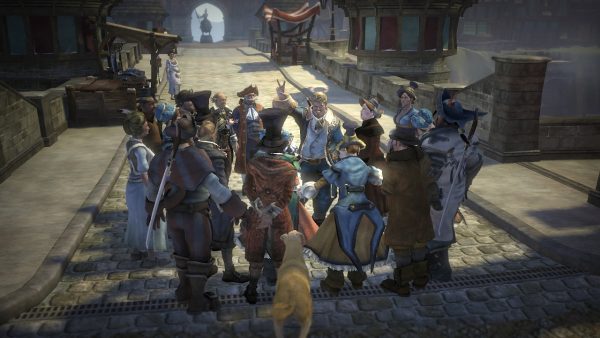
Romance in Fable and its sequels is not a complicated social ritual: the right combination of gifts and fist pumps will secure more or less anyone’s love easily enough.
The point is that this is what video games, by and large, have to say about sex and romance: that they’re extractive and predictable. And worse still, for queer relationships in mainstream games, this is too often all we get. There’s enough damaging stereotypes about queer sexuality as it is, without video games portraying queer romance as something mechanical, short-term and broadly meaningless. I adore RPGs and I always will, but I’d like them even more if my options for romance weren’t just something else to level up to max. Love is not a skill tree. Sex is not a quest reward.
Another troubling element of playersexuality is that it seems to be gaming’s only answer to plurisexual representation. Bisexuality, for example, manifests in Dragon Age: Origins in Zevran and Leliana – the game’s two romance options for either a male or female Grey Warden. By the second game, every romanceable NPC in your party is an option for any player character. How did that happen? Did Hawke put out a very specific recruitment ad? Does Thedas have a hook-up app for wandering bisexual adventurers?
Bisexuals don’t really work that way (contrary to half the D&D games I’ve played in), and sexuality isn’t something that depends on whoever your team leader happens to be. It’s an inevitability of design that the player character is, by and large, going to be the center of the game world. In most cases the camera perspective literally follows them, the story’s events wait for their presence to unfold, and loot sits untouched in millennia-old dungeons for the chosen one guided by a PS4 controller to pilfer and sell it for 62 gold and a mana potion at the next town over. The world has to work that way. But the people in it don’t.
Herein lies the solution, I believe. Adopting a less player-centric view of in-game relationships can naturally engender a much more nuanced portrayal of the same, especially where plurisexuality is concerned. When all romance gravitates towards the player, plurisexuality just means courting them regardless of gender. But this is neglecting an opportunity to explore the unique dynamics of plurisexual experiences. Non-romanceable companions can have their own relationships: pre-existing ones, polygamous ones, ones that change throughout the course of the game (especially in your 80+ hour RPGs), ones that end here and begin there and aren’t necessarily restricted to one gender if the character in question isn’t.
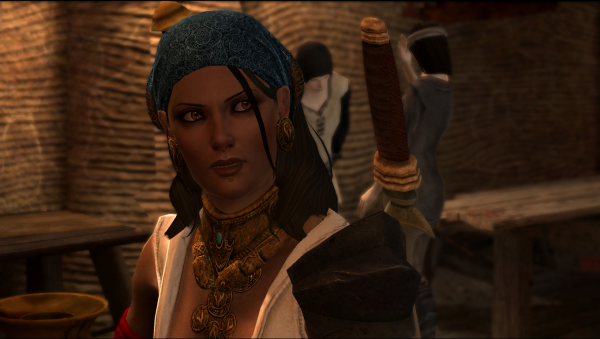
Like the other romanceable companions in Dragon Age II, Isabela is up for it with a male or female Hawke.
That doesn’t even have to rule out player romance, either. Who’s to say your team’s frontline fighter doesn’t separate from her girlfriend by the end of act one and start seeing the protagonist in a new light? Why can’t your romanceable engineer have a change of heart halfway through the game and start pursuing relationships elsewhere, or not at all? I’m not saying every game need account for every possibility, but wouldn’t it be that much more interesting and organic for your NPC buddies to experience sex and romance like real people?
In her post on the subject, Dr. Cole outlines a few helpful considerations for developers looking to incorporate more meaningful, developed and otherwise true-to-life depictions of plurisexuality. But developers aren’t releasing games in a vacuum.
By now, we’re all familiar with the idea of games becoming ‘overly politicized’. For some reason, this term only seems to gravitate around games that spotlight an openly queer protagonist (or literally any woman) rather than, say, any number of the shooters depicting deployment of US troops in the Middle East, or a Randian dystopia at the bottom of the Pacific.
No one really objects to politics in their games, or they’d have kicked up a fuss a long time before Ellie kissed a girl in The Last of Us 2’s E3 trailer. So what, exactly, is the problem here? We know heterosexual relationships aren’t ‘political’, yet queer ones are. Representing something which is already abundantly normalized upsets no one, and so the implication (albeit sometimes a very explicit one) is that queer content has no place in gaming, and that the medium should serve only a presumed heterosexual audience.
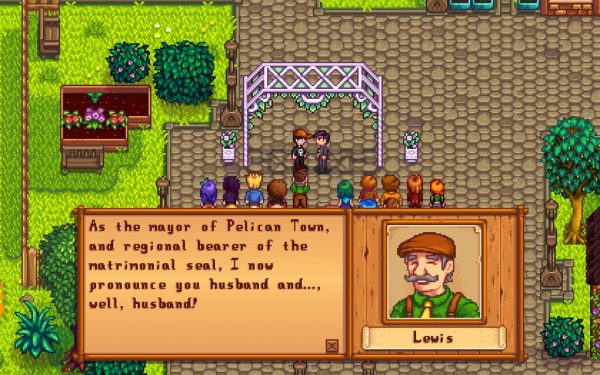
The residents of Stardew Valley’s Pelican Town aren’t at all concerned with a potential paramour’s gender – but the universal plurisexuality in this rural town is never mentioned.
As such, triple-A titles (generally) won’t touch the topics that indie games can handle with more nuance, since the latter can target a less hostile audience. Publishers know that bold steps towards positive queer representation just do not sit as well with certain crowds — and so baby steps it is. No one minds if Josephine Montilyet is bisexual as long as she keeps it to herself in a male/female pairing with the player character. No one cares if their Stardew Valley neighbors are pan as long as we don’t have to think about this town as a pansexual colony. Queer sexuality, it seems, is only ‘political’ when it’s visible.
Playersexuality won’t be going anywhere anytime soon, and as long as it’s there alongside more comprehensive and human depictions of sexuality too, it’s not the end of the world. But therein lies the real issue, because ensuring good representation means having to address some issues that are typically left out of the spotlight, even though it may invoke the ire of the homophobic crowd. This is a necessary risk, and one that falls to studios to take if they’re as serious about LGBT+ inclusion as the fields of rainbow logos that roll around for Pride every year imply. Triple A studios have the ability to reach a broad audience with their games, and with that reach comes a degree of power and influence. While the efforts of indie devs are important in their own way, it’s the blockbusters that have the capacity to cause decisive changes in the way queer people are represented in gaming. But what they can’t do is half-heartedly tack plurisexuality onto NPC companions and call that a day for representation. Your queer meat-shields deserve better.
James McCoull is a Literature graduate with a penchant for sci-fi and crying at the end of Red Dead Redemption. Twitter: @edamessiah.